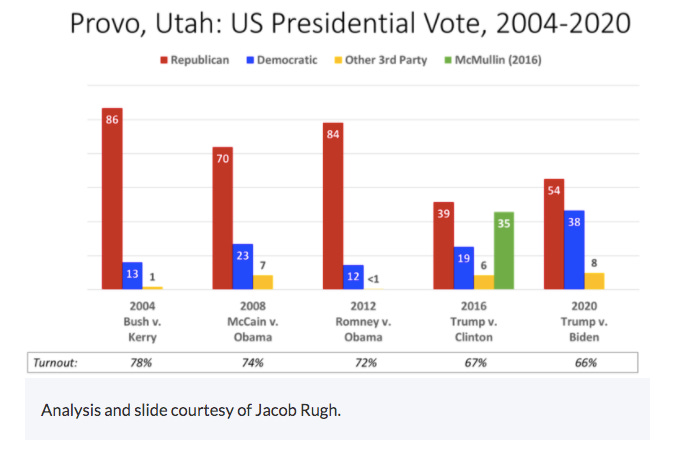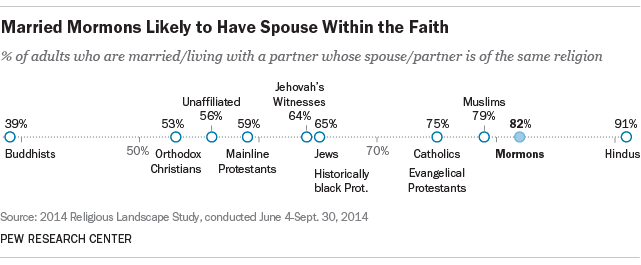Ryan Burge points out that many religious groups have moderated politically. In particular, Latter-day Saints (Mormons) identified as significantly less Republican and less politically conservative in the most recent election than they did in 2008.
We find further evidence of this shift in actual election results. Biden did better in Utah than any Democrat since Lyndon B. Johnson and arguably captured just enough of the Mormon vote to win Arizona. Even Provo, which is 90% LDS and home to Brigham Young University, has turned almost purple during the Trump years:
Are these trends likely to hold for Mormons? Some points for and against:
Reasons moderation will continue…
Demographics
Mormons are the youngest Christian faith group, with nearly a quarter of membership under the age of 30. While the vast majority of these young Mormons are white, they are still significantly more diverse than Mormons over 65. Insofar as younger, non-white Americans tend to be less conservative, we should expect some continued softening of the church’s solid Republican image.
Marriage and Education
The stereotypical Mormon is happily married at a young age and remains that way, but that is beginning to change. A majority of adult membership is now never-married, divorced, or widowed and this may affect voting patterns and identification. Single women especially tend to skew left of their married counterparts and this will likely manifest within Mormonism to an increasing degree if men continue to leave the church at higher rates.
Meanwhile, Mormons continue to achieve high levels of educational attainment at a time when educational polarization is on the rise. In contrast to some other religious groups, educated Mormons are among the most active in their faith. If educated Mormons are pulled left by broader educational trends, they may have a moderating influence on the broader membership as well.
Trump
Perhaps the clearest conclusion we can draw from the “Mormon Moderation” is that many Mormons do not like Trump. The former president’s brash antagonism toward political opponents doesn’t jive well with the Mormon tendency to take the high road and his personal morality has been a bigger obstacle to whole-hearted support from Mormons than it has been for Evangelicals.
Trump has been quiet as of late but remains the favorite to win the Republican nomination, and several astute pundits believe his chances are substantially better than betting markets suggest. If Trump wins the nomination (or especially the election) in 2024, expect young Mormons to continue identifying as independents at high rates and some who voted Democrat for the first time in 2020 to stick around.
Reasons moderation will be fleeting…
Differential Birthrates
Many people associate Mormons with large families and this bears out strongly in the data. Beyond being especially likely to be married and have children, the LDS have a surprisingly low rate of intermarriage. This not only contributes to a growing share of Mormons in the general population but also favors more fertile subgroups within the LDS to determine group composition going forward. Insofar as conservative members raise larger families in circumstances more likely to lead to sustained church membership, this points toward Mormons shifting back toward the Right over a long enough time horizon. A similar dynamic is already visible in Israel, where the most conservative Jewish sects are rapidly growing as a share of the population.
Home and Country
Leo Tolstoy famously said that “Mormons teach the American religion”. While data confirming this suggested link between Mormons and the American way of life is somewhat limited, a recent survey of Christian Nationalism suggests that Mormons view patriotism and religious faith as substantially intertwined. If the ‘patriotism-gap’ continues to widen between the two parties, Republican identification may become more palatable in relative terms.
In a similar vein, Mormons are commonly associated with family values. 81% believe that being a good parent is one of the most important things in life, relative to just 50% in the general population. Here too the Democratic party is in a difficult position to court Mormons, as the rhetoric common in progressive publications and promoted by prominent voices on Twitter often seems increasingly hostile to family formation. You can shout your abortion, but an op-ed honoring motherhood on Mother’s Day could land you in hot water. Mormons may respond to intensifying antagonism to traditional families by identifying more strongly with the Republican party, warts and all.
Secularization
While some Democratic candidates made sustained appeals to religious faith during last year’s primary, the party is becoming notably less religious over time. Christians are dropping rapidly as a share of the party, and religiously unaffiliated voters now make up nearly 30% of the total. Among white Democrats, a plurality now say that religion is not at all important to them. As these trends take hold, it will become increasingly difficult for the Democratic base to resist the urge to demean religious people.
Conclusion?
The Mormon Moderation we see in partisan and ideological self-identification is likely to persist in the short-term. I give 75% odds that “Mormon-2024” ends up in the same grid in the chart opening this post as “Mormon-2020”—bordering ‘Conservative’ and ‘Lean Rep’—and 60% odds that “Mormon-2028” lands there. If I am wrong, the most likely scenario is that Mormons shift just enough to the right to cross the lean Republican line again.
Forecasting the medium-term is more tricky. One likely scenario for the next 10-20 years is that moderate political identifications retain some residual stickiness from the Trump era, while largely disappearing from actual voting patterns. Nominally independent Mormons will vote like Republicans for the most part.
An alternate prediction involves Mormons embracing the role of diplomat, expanding the range of commonly held views within the faith while emphasizing consensus building over ideological purity. This is particularly likely if extreme characters and movements continue to hold sway on the Right, which turn Mormons off and prompt calls for temperance and civility from church leaders. If circumstances seem dire enough, moderate Mormon leaders will emerge to attempt to shift the balance toward creating more light rather than heat, and perhaps this will happen on the Left as well as the Right.
And in the long-term? Mormons will inherit the Earth.








Thanks for the insights! You may be interested in this praise for the Mormon Right as well: https://www.economist.com/united-states/2021/04/29/why-utahs-conservatism-is-better
nice analysis here, excited to see more of your posts